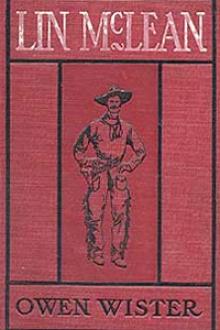The Virginian: A Horseman of the Plains, Owen Wister [best e books to read txt] 📗

- Author: Owen Wister
Book online «The Virginian: A Horseman of the Plains, Owen Wister [best e books to read txt] 📗». Author Owen Wister
And his forces were, as I have said, scattered. For his promotion gave him no more time for love-making. He was foreman now. He had said to Judge Henry, “I'll try to please yu'.” And after the throb of emotion which these words had both concealed and conveyed, there came to him that sort of intention to win which amounts to a certainty. Yes, he would please Judge Henry!
He did not know how much he had already pleased him. He did not know that the Judge was humorously undecided which of his new foreman's first acts had the more delighted him: his performance with the missionary, or his magnanimity to Trampas.
“Good feeling is a great thing in any one,” the Judge would say; “but I like to know that my foreman has so much sense.”
“I am personally very grateful to him,” said Mrs. Henry.
And indeed so was the whole company. To be afflicted with Dr. MacBride for one night instead of six was a great liberation.
But the Virginian never saw his sweetheart alone again; while she was at the Sunk Creek Ranch, his duties called him away so much that there was no chance for him. Worse still, that habit of birds of a feather brought about a separation more considerable. She arranged to go East with the Ogdens. It was so good an opportunity to travel with friends, instead of making the journey alone!
Molly's term of ministration at the schoolhouse had so pleased Bear Creek that she was warmly urged to take a holiday. School could afford to begin a little late. Accordingly, she departed.
The Virginian hid his sore heart from her during the moment of farewell that they had.
“No, I'll not want any more books,” he said, “till yu' come back.” And then he made cheerfulness. “It's just the other way round!” said he.
“What is the other way round?”
“Why, last time it was me that went travelling, and you that stayed behind.”
“So it was!” And here she gave him a last scratch. “But you'll be busier than ever,” she said; “no spare time to grieve about me!”
She could wound him, and she knew it. Nobody else could. That is why she did it.
But he gave her something to remember, too.
“Next time,” he said, “neither of us will stay behind. We'll both go together.”
And with these words he gave her no laughing glance. It was a look that mingled with the words; so that now and again in the train, both came back to her, and she sat pensive, drawing near to Bennington and hearing his voice and seeing his eyes.
How is it that this girl could cry at having to tell Sam Bannett she could not think of him, and then treat another lover as she treated the Virginian? I cannot tell you, having never (as I said before) been a woman myself.
Bennington opened its arms to its venturesome daughter. Much was made of Molly Wood. Old faces and old places welcomed her. Fatted calves of varying dimensions made their appearance. And although the fatted calf is an animal that can assume more divergent shapes than any other known creature,—being sometimes champagne and partridges, and again cake and currant wine,—through each disguise you can always identify the same calf. The girl from Bear Creek met it at every turn.
The Bannetts at Hoosic Falls offered a large specimen to Molly—a dinner (perhaps I should say a banquet) of twenty-four. And Sam Bannett of course took her to drive more than once.
“I want to see the Hoosic Bridge,” she would say. And when they reached that well-remembered point, “How lovely it is!” she exclaimed. And as she gazed at the view up and down the valley, she would grow pensive. “How natural the church looks,” she continued. And then, having crossed both bridges, “Oh, there's the dear old lodge gate!” Or again, while they drove up the valley of the little Hoosic: “I had forgotten it was so nice and lonely. But after all, no woods are so interesting as those where you might possibly see a bear or an elk.” And upon another occasion, after a cry of enthusiasm at the view from the top of Mount Anthony, “It's lovely, lovely, lovely,” she said, with diminishing cadence, ending in pensiveness once more. “Do you see that little bit just there? No, not where the trees are—that bare spot that looks brown and warm in the sun. With a little sagebrush, that spot would look something like a place I know on Bear Creek. Only of course you don't get the clear air here.”
“I don't forget you,” said Sam. “Do you remember me? Or is it out of sight out of mind?”
And with this beginning he renewed his suit. She told him that she forgot no one; that she should return always, lest they might forget her.
“Return always!” he exclaimed. “You talk as if your anchor was dragging.”
Was it? At all events, Sam failed in his suit.
Over in the house at Dunbarton, the old lady held Molly's hand and looked a long while at her. “You have changed very much,” she said finally.
“I am a year older,” said the girl.
“Pshaw, my dear!” said the great-aunt. “Who is he?”
“Nobody!” cried Molly, with indignation.
“Then you shouldn't answer so loud,” said the great-aunt.
The girl suddenly hid her face. “I don't believe I can love any one,” she said, “except myself.”
And then that old lady, who in her day had made her courtesy to Lafayette, began to stroke her niece's buried head, because she more than half understood. And understanding thus much, she asked no prying questions, but thought of the days of her own youth, and only spoke a little quiet love and confidence to Molly.
“I am an old, old woman,” she said. “But I haven't forgotten about it. They objected to him because he had no fortune. But he was brave and handsome, and I loved him, my dear. Only I ought to have loved him more. I gave him my promise to think about it. And he and his ship were lost.” The great-aunt's voice had become very soft and low, and she spoke with many pauses. “So then I knew. If I had—if—perhaps I should have lost him; but it would have been after—ah, well! So long as you can help it, never marry! But when you cannot help it a moment longer, then





Comments (0)